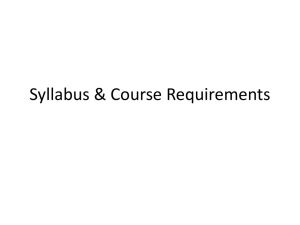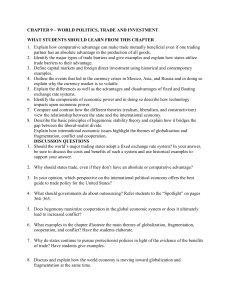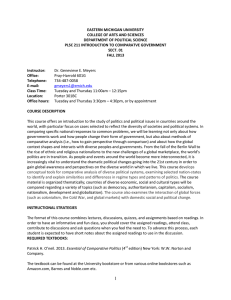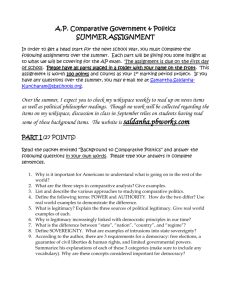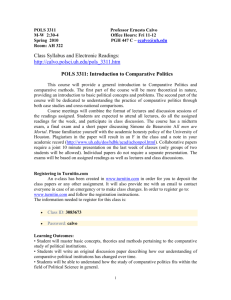AP Comparative Syllabus - Pearland Independent School District
advertisement
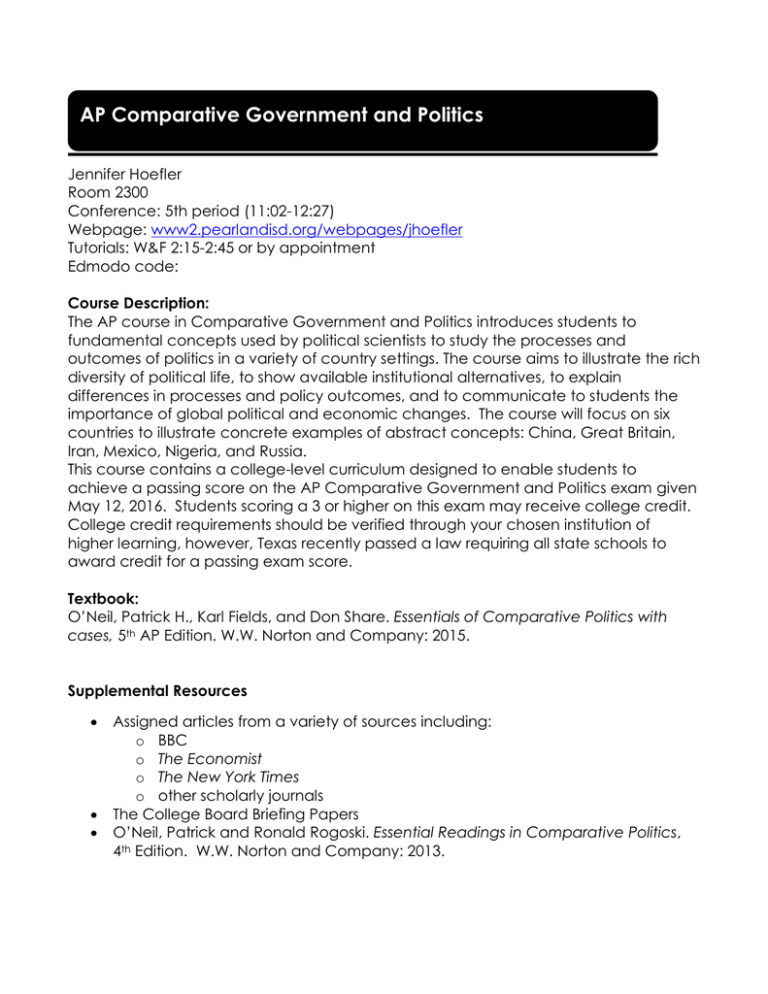
AP Comparative Government and Politics Jennifer Hoefler Room 2300 Conference: 5th period (11:02-12:27) Webpage: www2.pearlandisd.org/webpages/jhoefler Tutorials: W&F 2:15-2:45 or by appointment Edmodo code: Course Description: The AP course in Comparative Government and Politics introduces students to fundamental concepts used by political scientists to study the processes and outcomes of politics in a variety of country settings. The course aims to illustrate the rich diversity of political life, to show available institutional alternatives, to explain differences in processes and policy outcomes, and to communicate to students the importance of global political and economic changes. The course will focus on six countries to illustrate concrete examples of abstract concepts: China, Great Britain, Iran, Mexico, Nigeria, and Russia. This course contains a college-level curriculum designed to enable students to achieve a passing score on the AP Comparative Government and Politics exam given May 12, 2016. Students scoring a 3 or higher on this exam may receive college credit. College credit requirements should be verified through your chosen institution of higher learning, however, Texas recently passed a law requiring all state schools to award credit for a passing exam score. Textbook: O’Neil, Patrick H., Karl Fields, and Don Share. Essentials of Comparative Politics with cases, 5th AP Edition. W.W. Norton and Company: 2015. Supplemental Resources Assigned articles from a variety of sources including: o BBC o The Economist o The New York Times o other scholarly journals The College Board Briefing Papers O’Neil, Patrick and Ronald Rogoski. Essential Readings in Comparative Politics, 4th Edition. W.W. Norton and Company: 2013. Curriculum Outline I. Unit One: Introduction to Comparative Government 3weeks a. Readings: i. Comparative Politics and Introduction 1. Introductory Chapter 1 [provided by teacher] 2. O’Neil (pages 6-19) ii. Globalization and Democratization 1. College Board Briefing Paper: Democratization 2. Florida, Richard “The World is Spiky” from Essentials b. Themes and Concepts to be covered (among others) i. Comparative Politics [1 week] 1. Definition 2. Comparative Politics as a science a. Different types of research b. Normative and empirical considerations c. Levels of analysis ii. Introduction to Comparative Study [1 week] 1. Political legitimacy 2. Sovereignty, Power, and Authority: Students will be able to define these terms and apply concepts to particular country cases 3. Regime types and Political Institutions 4. Nations, States, and Nation-States: Students will be able to define these terms and apply concepts to particular country cases 5. Citizens, Society, and the State – including political participation iii. Globalization [1 week] 1. Economic globalization 2. Globalization and Inequality 3. Global governance a. The World Bank, IMF, WTO, WHO, UN, EU, NAFTA, GATT c. Activities i. Students will use scholarly research articles to identify types of variables, empirical/normative research, and analyze limits of research II. Unit Two: Great Britain[Advanced Democracies] 2 weeks a. Readings i. O’Neil, Case 1 - United Kingdom (pg 238) ii. Bailey, Suzanne “The British Electoral System and the 2005 British Elections” iii. Gov.UK: “David Cameron’s Immigration Speech” 3.25.13 iv. Economist: “How to Sell the National Health Service” 8.3.13 b. Themes and Concepts to be covered (among others) i. Historical Foundations: constitutionalism, Colonialism, Legitimacy, Nation/State, Liberal Democracy British citizens, Society, and the State: Demographics, Cleavages, Civil Society ii. Political Institutions: Political Parties/Elections, Westminister Model, Parliamentary and Presidential Systems iii. Role of E.U.: Sovereignty iv. Public Policy: Thatcherism and the Third Way, N. Ireland, Role of National Health Service, Immigration, Terrorism c. Activities i. Vocabulary ii. Watch Question Hour on CSPAN iii. Analyze recent election returns for trends d. Assessment i. Multiple Choice Exam with Short Answer Questions/Analytical Essays ii. Country Portfolio (more information attached) III. Unit Three: Russia [Post Communist] 2 weeks a. Readings i. O’Neil, Case 2 – Russia (pg 364) ii. Marx and Engels, “Manifesto of the Communist Party” [ER] b. Themes and Concepts to be covered (among others) i. Historical Foundations and Political Change: Tsars to Bolsheviks, Soviet Union, glasnost, post-Cold War, ii. Russian Citizens, Society and the State: Slavophile v. Westernizer iii. Political Institutions: President/Prime Minister, Illiberal Democracy, Duma, Corporatism iv. Policy: G8, Chechnya c. Activities i. Vocabulary ii. Russian Political Culture (CFL Activity)- compare to U.S. political culture d. Assessment i. Multiple Choice Exam with Short Answer Questions/Analytical Essays ii. Country Portfolio IV. Unit Four: China [Communist] 2 weeks a. Readings i. O’Neil, Case 3 – China (pg 414) ii. Economist: “The Real Great Leap Forward” 9.30.04 iii. Bloomberg Business Week: “China Moves on Reforming Hukou?” 6.28.13 iv. Economist: “Worried in Beijing” 8.5.99 v. BBC: “China’s Intolerance of Dissent” 3.8.05 vi. Baogang He and Mark E. Warren; “Authoritarian Deliberation: The Deliberative Turn in Chinese Political Development” [ER] b. Themes and Concepts to be covered (among others) i. Historical Foundations: Revolution, Cultural Revolution, Economic Modernization ii. Chinese Society: Rich/poor cleavages iii. Political Institutions: Guanxi Corruption, Mass Line, Democratic Centralism iv. Public Policy: Privatization, Falun Gong, Taiwan and Tibet, One Child Policy and Hukou system c. Activities i. Vocabulary ii. Russia/China Economic Comparison iii. YouTube: Tiananmen Square – NBC News Special Report d. Assessment i. Multiple Choice Exam with Short Answer Questions/Analytical Essays ii. Country Portfolio V. Unit Five: Mexico[Newly Industrialized] 2 weeks a. Readings i. O’Neil, Case 5 – Mexico (Ch 564) ii. Economist: “Redrawing the Federal Map” 3.27.03 iii. Economist: “Shallow Graves, Deeping Alarm” 4.28.11 b. Themes and Concepts to be covered (among others) i. Historical Foundations ii. Mexican Citizens, Society and the State iii. Political Institutions: Camarilla, Corporatism, Legitimate Elections iv. Public Policy: NAFTA, Chiapas, Immigration, Structural Adjustment c. Activities i. Vocabulary ii. Compare Mexico and Russia Party Systems (from College Board) d. Assessment i. Multiple Choice Exam with Short Answer Questions/Analytical Essays ii. Country Portfolio VI. Unit Six: Nigeria[Less Developed Country] 2 weeks a. Readings i. O’Neil, Case 6 – Nigeria (pg 622) ii. Collier, Paul and Jan Willem Gunning, “Why Has Africa Grown Slowly” [ER] b. Themes and Concepts to be covered (among others) i. Historical Foundations: Colonialism, Military Coups, Authority ii. Nigerian Citizens, Society and the State iii. Political Institutions: Religion and Federalism, National Assembly iv. Public Policy: Corruption, Terrorism, Poverty, Oil v. Political Violence c. Activities i. Vocabulary ii. Nigeria’s Political Party System – CFL Activity iii. Political Economy – Bead Game: Students will analyze the difficulty for less developed countries with a more globalized economy iv. Political Development: Students will analyze the concepts related to economic structure and development and compare each of the six countries v. Nigerian Boko Haram Simulation d. Assessment i. Multiple Choice Exam with Short Answer Questions/Analytical Essays ii. Country Portfolio VII. Unit Seven: Iran [Newly Industrialized] 2 weeks a. Readings i. O’Neil, Case 4 – Iran (pg 510) ii. BBC News: “Neda Agha Soltan’s Family Accused Iran of Her Killing” 12.4.09 b. Themes and Concepts to be covered (among others) i. Historical Foundations: Revolution (Political Change) ii. ranian Citizens, Society, and the State: Globalization/Fragmentation iii. Political Institutions: Role of Islam, Theocracy iv. Public Policy: Petropolitics, Nuclear Weapons, Iraq c. Activities i. Vocabulary ii. Policy Making In Iran – CFL Activity: Students will analyze decision making process of Iran iii. Iranian Spelling Bee: Students must match concepts and people to their correct description then students may volunteer for the spelling bee d. Assessment i. Multiple Choice Exam with Short Answer Questions/Analytical Essays ii. Country Portfolio Student Evaluation Following school board policy, 60% of a student’s grade will be based on major assignments and 40% on daily grades. Major grades Unit exams: Each unit exam will consist of multiple choice and short-answer/Free Response Question writing tasks to mirror the AP Exam. The intent of shortanswer questions is for the student to think analytically about the concepts and countries addressed throughout the course. For a tentative list of test dates, please visit our class Edmodo page Daily grades Vocabulary quizzes, reading quizzes, in-class assignments, discussions, writing assignments, etc. Current Event Article Analysis Country Portfolios: Once we begin our case studies, you will be required to complete country portfolios. The portfolios will be worth a minimum of two daily grades for each unit of study. These portfolios will be due each test day and should guide your studying for the particular unit. Notice The instructor reserves the right to alter or change the above schedule at any time to accommodate unforeseen circumstances, but will not do so without proper notification. Test Retake Policy Pearland High School’s grading policy permits students to prove mastery of content by retaking failed tests. In this class, test retakes will be formatted as an FRQ question that can cover any of the content from the test in question to ensure mastery. You must request and complete the retake within one week of receiving your test grade. Make-up Policy Students absent from class are responsible for meeting with the teacher before or after school to discuss any missing assignments, tests, or other material. Academic Integrity Academic integrity is the pursuit of scholarly activity free from fraud and deception and is an educational objective of this institution. Academic dishonesty includes, but is not limited to, cheating, plagiarizing, fabricating of information or citations, facilitating acts of academic dishonesty by others, having unauthorized possession of examinations, submitting work of another person or work previously used without informing the instructor, or tampering with the academic work of other students. Any violation of the above will be punished to the fullest extent permitted by district policy and may result in removal from the advanced placement program.

